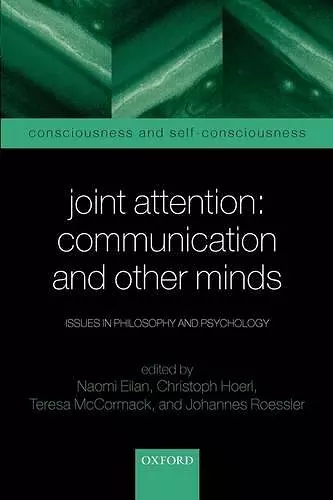Joint Attention: Communication and Other Minds
Issues in Philosophy and Psychology
Christoph Hoerl editor Teresa McCormack editor Johannes Roessler editor Naomi Eilan editor
Format:Paperback
Publisher:Oxford University Press
Published:3rd Mar '05
Currently unavailable, and unfortunately no date known when it will be back
This paperback is available in another edition too:
- Hardback£162.50(9780199245642)

An international team of psychologists and philosophers present the latest research into the fascinating cognitive phenomenon of 'joint attention'. Some time around their first birthday most infants begin to engage in a behaviour that is designed to bring it about - say, by means of pointing or gaze-following - that their own and another person's attention are focused on the same object. Described as manifestations of an emerging capacity for joint attention, such triangulations between infant, adult and the world are often treated as a developmental landmark and have become the subject of intensive research among developmentalists and primatologists over the past decade. More recently, work on joint attention has also begun to attract the attention of philosophers. Fuelling researchers' interest in all these disciplines is the intuition that joint attention plays a foundational role in the emergence of communicative abilities, in children's developing understanding of the mind and, possibly, in the very capacity for objective thought. This book brings together, for the first time, philosophical and psychological perspectives on the nature and significance of the phenomenon, addressing issues such as: How should we explain the kind of mutual openness that joint attention seems to involve, i.e. the sense in which both child and adult are aware that they are attending to the same thing? What sort of grip on one's own and other people's mental states does such awareness involve, and how does it relate to later-emerging 'theory of mind' abilities? In what sense, if any, is the capacity to engage in joint attention with others unique to humans? How should we explain autistic children's seeming incapacity to engage in joint attention? What role, if any, does affect play in the achievement of joint attention? And what, if any, is the connection between participation in joint attention and grasp of the idea of an objective world? The book also contains an introductory chapter aimed at providing a framework for integrating different philosophical and psychological approaches to these questions.
Although the methodological approaches that the volume brings together are widely various, its contributors have evidently learned a good deal from one another, and the result displays much more coherence than one might have expected from a book in which philosophy of various sorts shares space with primatology and with discussions of autism. This impressive coherence is heartening to the reader who has entertained fears about philosophy's ability to stay relevant when faced with psychology's unabating torrent of freshly gathered data. The volume provides every reason to suppose that joint attention is a topic on which philosophy and other disciplines can collaborate fruitfully. * Christopher Mole, Notre Dame Philosophical Reviews *
The book's one paper with interdisciplinary authorship is a clear highlight -- a provocative and sophisticated discussion of joint reminiscing by Christoph Hoerl and Teresa McCormack, both of whom are among the book's editors. Interdisciplinary work is rarely so well accomplished as theirs . . . neither the contributions individually, nor the book as a whole, depends on their interdisciplinarity for their interest. The philosophical reader will, in fact, find much to be interested by at those points where the various disciplines don't naturally converge. . . . Eilan and the editors with whom she has collaborated on this volume have achieved a work that advances our understanding of joint attention and of the several important phenomena in which it has a role. * Christopher Mole, Notre Dame Philosophical Reviews *
ISBN: 9780199245635
Dimensions: 234mm x 156mm x 20mm
Weight: 525g
348 pages